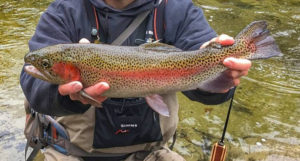 If you’ve just started, you’ll more than realize that fly fishing is more than a physical sport. In addition to biomechanical benefits, you also benefit psychologically and socially. Getting the hang of the sport takes time and effort. With the right tips and techniques, you can become a fly fishing expert. We asked the team at Fly Fisher Pro for five tips to up your fly fishing game and here’s what they said:
If you’ve just started, you’ll more than realize that fly fishing is more than a physical sport. In addition to biomechanical benefits, you also benefit psychologically and socially. Getting the hang of the sport takes time and effort. With the right tips and techniques, you can become a fly fishing expert. We asked the team at Fly Fisher Pro for five tips to up your fly fishing game and here’s what they said:
1. Find the Right Fishing Spot
The most important skill to level up your fly fishing game is to understand how to find the perfect fishing spot. Knowing where to find most of the fish you are interested in will set you ahead of other learners. Environmental factors will play a key role in determining the perfect fly fishing spot. That includes researching variations in water temperatures, stream flows and insect population.
Look for pockets of slow water where there is a gentle downstream flow without upstream currents. You are likely to find these near the riverbank, inside bends and behind rocks. In such cases, short casts are the preferred technique, between 10 and 20 feet. Save your long 10-foot rods for the high waters but avoid complex currents that make it tougher to fish, even when you become a fly-fishing professional.
2. Refine Your Presentation
Drag is a common problem in fly presentation and may negatively impact your fly fishing game. It may be hard to spot, but if you use a more visible fly, you are likely to catch even slight occurrences of drag. Your tippet length directly correlates with the amount of drag generated and is critical, especially in trout fishing. Use a longer tippet to minimize drag, and you will enjoy a fulfilling fly fishing experience. For leaders between nine to twelve feet long, a four-foot tippet should be the minimum size.
There are other ways you can reduce drag and avoid alarming the trout you intend to catch. For a drag-free presentation, learn to mend the fly line both while casting or when your flies are still drifting. Other methods include attaching your fly using a loop know and using a lighter tippet material.
3. Master Various Casting Techniques
Having the right tools but lacking the mastery of fly fishing techniques will result in you feeling frustrated. Here we look at casting, which forms the backbone of fly fishing. Two important considerations are line length and management. You will need to know the tuck cast to help you sink your nymphs to the bottom faster. With the roll cast, you can fish in tight spots comfortably and efficiently. Moreover, you can use the downstream water load technique to help you relaunch your flies back upstream for another drift.
Since every fly fishing location and occasion calls for a different cast, you are better off if you understand a few casting methods. For example, if you are fly fishing on a windy day, you will need to learn the haul cast to achieve drag-free and effective nymphing.
4. Get the Right Gear
An essential tip for successful fly fishing is matching your flies with the fish’s food choice. To know what fly to use, you need to know the bugs on the trout’s favourite list. There are up to 13 major categories that can prove challenging to master initially. However, with persistent effort, you will know their colours, sizes, and hatching seasons, which will significantly improve your fly fishing game.
The other important aspect is choosing the most effective fly line. Look for modern lines made of an inner core coated with a form of plastic. Good lines are about 30 yards in length and must be double tapered. Alternatively, go for the weight forward line that has the first 10 to 12 yards weighted. You should put the heavier weighted section in the air to prevent cracking. Finally, make it a culture to wash your lines using the appropriate substance every four trips to keep them working longer.
5. Keep a Company That Challenges You
The best way to become better is to challenge yourself, and what better way to do that than to fish with better anglers than yourself? Find like-minded individuals in your community and tag along to practise together. You will benefit from their expertise, and even just watching them catch fish with ease will challenge you to become better. Additionally, consult expert material in fly fishing and equip yourself with more knowledge.
After finding the perfect fishing spot and refining your presentation skills, you should be off to a good start. Moreover, work on mastering several casting techniques, get quality gear and experienced anglers to challenge you. Finally, if you enjoyed our compilation of quick tips to spice up your fly fishing game, give us some feedback in the comments and share the article on your social media platforms.
